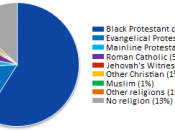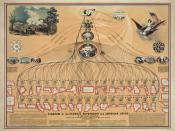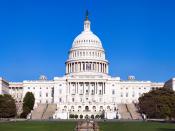University of PhoenixMGT/434February 13, 2006This paper will look at the similarities and differences in the way the federal and state systems of government apply employment laws. The state can create as many laws for employment as long as they do not specifically conflict with the federal laws.
The Constitution divides powers between state and federal governments. However, if a state law conflicts with a federal law, the federal law takes precedence over the state law. The powers the Constitution provides states is called reserve powers, which allows states to have their own individuality, while still being part of the United States. This issue of employment laws is one of the cases that have gone to the national level, and thus the federal laws regulate employment.
Federal government has the right to regulate employment laws because certain regions or even whole states may discriminate against certain individuals or may require certain qualifications that only a certain group of individuals meet.
For example, areas in the southern area of the United States that discriminate against African Americans would be able to deny employment to African Americans if the federal government did not regulate these laws.
If states laws were able to create their own employment regulations, the employment system and process would differ from state to state. For example, if one state discriminated against certain a certain ethnic and a neighboring state welcomed that ethnic group; a very low population of that ethnic group would be in the state of the employers that discriminate. Discrimination against certain groups has been banned by the federal government and is protected by the EEOC, which is the equal employment opportunity commission. The Civil Service Reform Act of 1978 (CSRA) contains a number of prohibitions, known as prohibited personnel practices, which are designed to promote overall...


